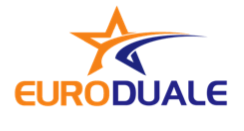Schema della sezione
-


EuroDuaLE
website
EuroDuaLE - European Cooperative Framework for Dual Learning - is an Erasmus+ Project, involving 13 organisations in 6 different EU Member States. The goal of EuroDuaLE is to develop an integrated transnational Dual Learning framework, where Higher Education Institutions and relevant stakeholders in the labour market establish a synergy and provide students with new curricula, combining formal training and training on-the job, physical and virtual mobility.
The sense of the Project
As stated in the 2020 Strategy, Europe increasingly needs people with the right combination of transversal competences, digital skills, creativity and adaptability, together with solid technical knowledge depending on the specific field. However, a growing number of employers highlight the disequilibrium and the difficulties to recruit people matching with their constantly evolving needs. High youth unemployment, even among highly skilled young adults, is the result of such delay, particularly dramatic in southern Europe. It emerges the necessity to involve employers in the definition of the curricula provided by HEIs, introduce the opportunity for students to combine practical experience with formal learning. In this context, Dual Learning Systems seem to have the potential to substantially increase the employability of young people at the end of the educational experience.Main phases of the Project
The Project started in September 2015 and ended in August 2018. EuroDuaLE aims to develop and test a framework or model that could be replicated in different contexts after the end of the project itself, and to which designers (HEIs, companies, associations, social parts, policy makers) of similar experiences can have access. The project is challenging, both for its dimensions (partners and duration) and for its goals. It is composed by three main phases. The first phase of the project, which is about one year long, is about the study of the context on dual learning regulation and practices in different european countries and on job-related youth mobility in Europe, with a focus on migration from Southern to Central-Northen Europe. The second part of the project is about the definition of a framework or model for transnational dual learning. Since it’s not possible to transfer the German model, the main best practice, as it is in other contexts - for cultural, institutional, social, economic reasons - the aim of this phase is to create a model that works around concentric circles: the core circle is about common principles and practices that define the model, while the other circles introduce specifications related to national, regional, field -contexts. The model will be developed, primarly, from a theoretical perspective, on the basis of the study of the context and the expertise of Partners. After that, a Practical Handbook will be created, to guide designers through the real implementation of the model - it will also contain a toolkit to help different stakeholders with management practices. The third and last phase of the project is the test of the model through a Piloting experience, during which some students of Partner HEIs will be involved in dual learning and (physical and virtual) mobility. You can find a more detailed explanation of activities of the project in the section Intellectual Outputs.

